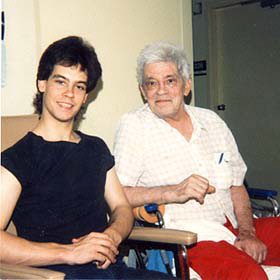I’ve been visited by images of my Dad recently. I would see his head of white hair, curved shoulders and back, leaning forward from his blue wheelchair. I would see his chin resting on his palm, his eyes aimed at the ceiling, lost in a small moment of reverie, reliving a happy memory or some past triumph.
The images like this are from Dad’s “toothless tiger” phase of life, his last few years after a heart attack, five strokes, and a fractured hip had put him close to death, but not out of the game. But most of his life, and all his best years, were behind him at this point.
His age fascinated me, because he represented a distant generation, where all the values and the photographic evidence was rendered in black and white. He had an answer for everything, and spoke in powerful and confident tones about his beliefs and actions. He was right, godammit, and he had always been right.
During the toothless tiger phase of his life, he was 65 and I was 20. By this time, he’d become more of a survivor of his own misfortune than anything, and his power was gone, lost due to personal neglect of his health.
Dad started smoking when he was about thirteen as I recall. Back in Prince Rupert in 1934, you rolled your own smokes if you couldn’t afford filtered cigarettes (which he told me were known as “Saturday Night Specials”). I’m willing to bet that he started with alcohol not too long afterwards. Smoking and drinking always seem to go hand-in-hand, and back in his day, were seen as socially acceptable and expected as young men grew up.
At one time, James Evan Love had been a provider, a force, a protector, and a threat within our family. But now he was diminshed and pacified, and as I finally lived away from him, running my own life on my own terms, our relationship changed to be more like that of two grown men.
Over the years from 1983 to 1985, Dad transformed from an authority figure whom I feared and respected, to a broken old man whom I pitied and feared to lose. We’d both faced his mortality and come away shaken. Now, embedded in his true sunset years, he seemed gentler and more light-hearted, and I think it was because he was actually happier. Living alone in his care home represented a form of new start for him, a physical change of pace and place with lots of help and no real responsibilities – a new world that might allow him to forget his past and pretend to be something much simpler: just Jim.
To stand by an alcoholic and an abuser is to be faced with contradictions and hypocracy, to oscillate between love and hate, respect and revulsion, loyalty and betrayal. It’s a delicate balance to flip the mirror between hero and villian. The image on each side may be absolutely true, yet relying on a delicate balance of time, place, and intention, to capture a fleeting moment of truth.
Yeah, it’s complicated.



